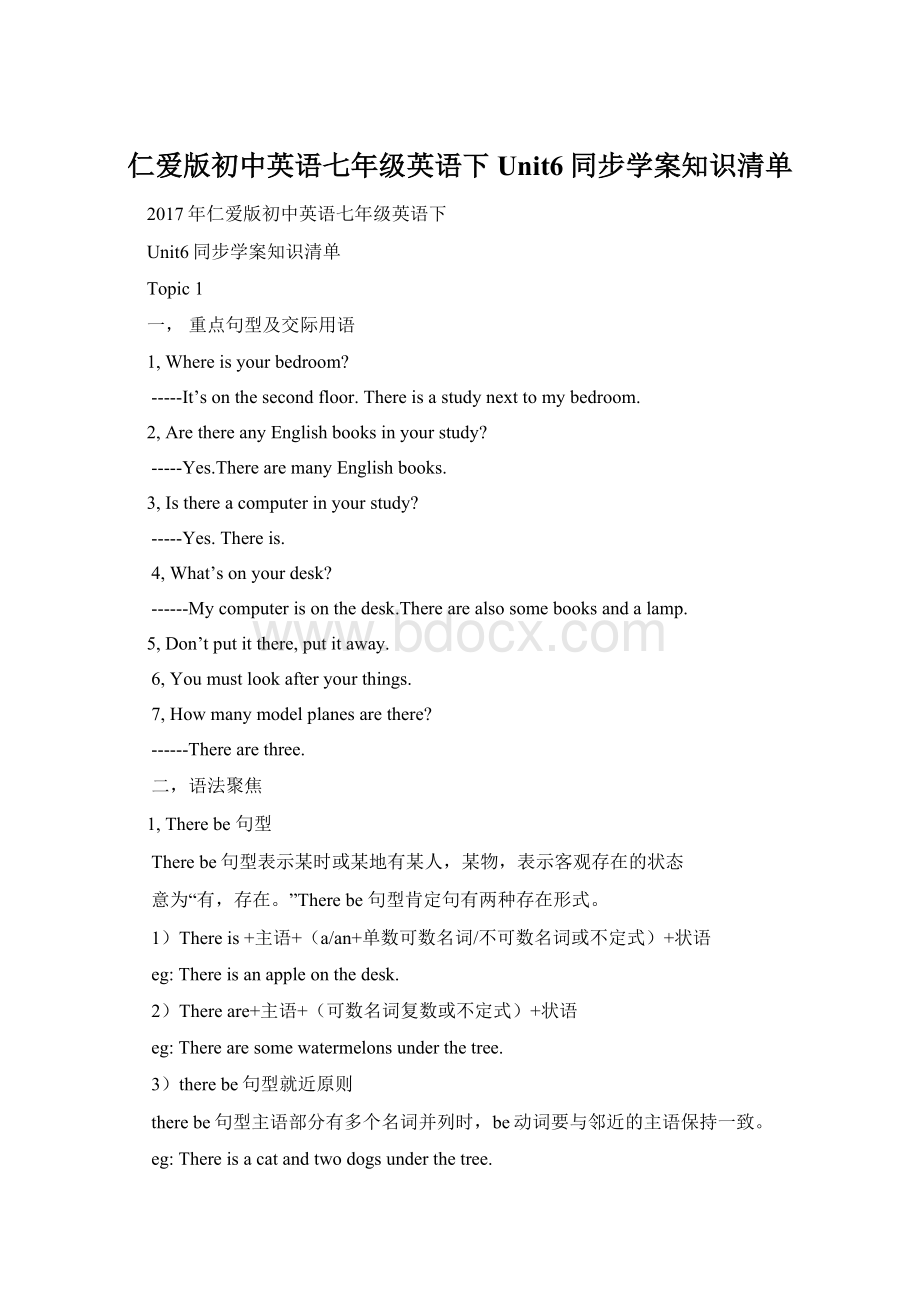仁爱版初中英语七年级英语下Unit6同步学案知识清单.docx
《仁爱版初中英语七年级英语下Unit6同步学案知识清单.docx》由会员分享,可在线阅读,更多相关《仁爱版初中英语七年级英语下Unit6同步学案知识清单.docx(16页珍藏版)》请在冰豆网上搜索。

仁爱版初中英语七年级英语下Unit6同步学案知识清单
2017年仁爱版初中英语七年级英语下
Unit6同步学案知识清单
Topic1
一,重点句型及交际用语
1,Whereisyourbedroom?
-----It’sonthesecondfloor.Thereisastudynexttomybedroom.
2,ArethereanyEnglishbooksinyourstudy?
-----Yes.TherearemanyEnglishbooks.
3,Isthereacomputerinyourstudy?
-----Yes.Thereis.
4,What’sonyourdesk?
------Mycomputerisonthedesk.Therearealsosomebooksandalamp.
5,Don’tputitthere,putitaway.
6,Youmustlookafteryourthings.
7,Howmanymodelplanesarethere?
------Therearethree.
二,语法聚焦
1,Therebe句型
Therebe句型表示某时或某地有某人,某物,表示客观存在的状态
意为“有,存在。
”Therebe句型肯定句有两种存在形式。
1)Thereis+主语+(a/an+单数可数名词/不可数名词或不定式)+状语
eg:
Thereisanappleonthedesk.
2)Thereare+主语+(可数名词复数或不定式)+状语
eg:
Therearesomewatermelonsunderthetree.
3)therebe句型就近原则
therebe句型主语部分有多个名词并列时,be动词要与邻近的主语保持一致。
eg:
Thereisacatandtwodogsunderthetree.
Therearetwodogsandacatunderthetree.
4)therebe句型疑问句及否定句
therebe句型疑问句将句中be动词提前至句首,句末加问号。
其否定句直接在be动词后面加not。
肯定句中的some在否定及疑问句中改为any。
eg:
Thereisn’tanyblackteaintheteapot.
Arethereanyhandsomeboysinyourclass?
5)对therebe句型主语进行提问时,常用What进行提问,并且常省略there。
无论主语是单词还是复数,be动词都用is。
eg:
Therearetwentyfivestudentsinthatglassbuilding.
What’sinthatglassbuilding?
对therebe句型数量进行提问时,常用Howmany/Howmuch进行提问
eg:
Therearetwentyfivestudentsinthatglassbuilding.
Howmanystudentsarethereinthatglassbuilding?
Therearefivebottlesofmilkonthedesk.
Howmuchmileisthereonthedesk?
2,区分floor和story/storey
floor意为“楼层”,常与介on连用。
英国
美国
第一层thegroundfloor
thefirstfloor
第二层thesecondfloor
thesecondfloor
第三层thethirdfloor
thethirdfloor
在表达几层楼房时,不用floor而用story.
eg:
Myfamilylivesonthefirstfloorofthat17-storybuilding.
Sheownsa5-storyhouse.
3,study即可做名词又可做动词,作名词意为“书房”,做动词以为“学习”。
eg:
Thereisastudynexttothebedroom.
Hestudiesinhisstudy.
4,andsoon意为“等等”,列举事物时用于句尾,表示列举完了同类事物。
eg:
Helikesapples,oranges,mangoesandsoon.
5,havealook.意为“看一看”,look做名词,其后还可以跟“at+宾语”
eg:
MayIhavealookatyournewcar.
扩充:
英语中很多动词可做名词,构成have+a+名词结构。
eg:
ride---havearideswim---haveaswim
rest---havearestwalk---haveawalk
6,What‘s+介词短语,主要用来询问“某处有什么”,应用therebe来回答。
eg:
What’sbehindyourgarden?
---Thereisarivebehindmygarden.
What’sunderthethere?
---Therearesomecatsandadogunderthetree.
7,区分onthewall及inthewall。
onthewall指物体在墙壁外部表面上
inthewall指物体部分或全部在墙体里。
eg:
Thereisaphotoofmysister’sonthewall.
Therearesomewindowsinthewall.
8,辨析inthefrontof/infrontof.
infrontof(不在同一范围内)在....前面反义词为:
behind
inthefrontof(属于同一范围)在....前面反义词为:
atthebackof.
eg:
Therearesomegrassinfrontofthehouse.
Thebusdriversitsinthefrontofthebus.
9,put相关词组辨析
puton穿上反义词:
takeoff
putup举起反义词:
putdown
putout提出
putaway将....收起
扩充:
putaway当中间宾语为代词时只能将宾语放在put和away中间。
eg:
Putthemaway
Putyourbookaway=Putwayyourbook.
10,介词play用法
playwithsb和某人一起玩
Playwithsth玩弄某物
eg:
Myclassmatesalwaysplaywithme.
Heoftenplayswithayo-yo.
注意:
玩电脑固定用语为:
playonthecomputer.
11,like/love+doingsthlike/lovetodosth
like/love+doingsth表示长期的兴趣爱好
like/lovetodosth表示特定或某次的喜欢
eg:
Helikewaling,buthedoesn’tliketowalktoday.
Ilovesinging,butIlovetodancetoday.
12,left即可以做名词也可做形容词及副词,left做名词意为“左边”。
常用短语ontheleftof...“在...的左边”反义词为:
ontherightof...
eg:
Thereisabigfarmontheleftofourschool.
Ontherightofthathilllocatedafactory.
13,helpsb(to)dosth意为:
“帮助某人做某事”sb后接不定式短语做宾补。
helpsbwithsth意为:
“帮助某人做某事”with后接名词。
eg:
Ioftenhelpmyclassmates(to)studyEnglish.
IoftenhelpmyclassmateswiththeirEnglish.
14,writesbaletter=write(aletter)tosb.给某人写信
getaletterfromsb收到某人来信
eg:
Doyouoftenwritetoyourparents.
Doyouoftenwriteyourparentsaletter.
仁爱版英语七年级下Unit6知识清单
Topic2
二,重点句型及交际用语
1,Whatkindofhomedoyoulivein?
-----It’satownhousewithtwofloors.
2,Wouldyoulikemetohelpyou?
-----Yes.Thanks.I’mlookingforastore.
3,Arethereanynearhere?
-----Yes.thereisoneinfrontofourbuilding.
4,Therearenohousesontheright,butthereisatalltree.
5,Therearemanyoldpeoplelivinghere.
6,Wecancallitforhelp.
7,Thetrafficisheavyandthecostoflivingishigh.
二,语法聚焦
1,kind名词意为“种类”,whatkindof...?
意为“哪种.....”?
eg:
Whatkindofsportsdoyoulike?
Whatkindofjuicedoyoulike?
拓展:
akindof一种,manykindsof许多种,allkindsof各种各样
kindof表示程度,意为“稍微,有点儿....”
eg:
Lemonladeisakindofjuice.
Shehasmanykindsofskirt.
Ilikeallkindsoffood.
Sheiskindoftired.
2,介词with的用法
1)表示人与人的协同关系。
意为“一起”“和”
eg:
gowith
playwith
livewith
workwith
2)表示“带有”“拥有”
eg:
coffeewithmilk
ahousewithabiggarden
achairwithfourlegs.
3)表示表示“用”某种工具或手段。
eg:
writewithapen
cutapplewithaknife
livewith
workwith
4)表示“在...身边”“在...身上”
eg:
Idon’thavemoneywithme.
Takeanumbrellawithyou.-
5)表示表示“在....下”
eg:
WiththehelpofmydeskmateIworkedoutthemathproblem.
6)表示“随着......”
eg:
withthedevelopmentof.....“随着...发展”
拓展:
with和and都表示“和”的意思,其区别为:
and是并列连词,
当连接两个主语表复数意义时,谓语动词用复数。
with是介词,
如果跟在主语之后表伴随转态,with之后所接的名词,代词与主语数无关。
eg:
Youandmearewalkingonthestreet.
Ioftengoshoppingwithmyfriends.
3,country意为:
“乡下,农村”,常用单数形式与the连用。
country还有“国家”的释义,可数形式为:
countries.
eg:
Mygrandpalivesinthecountry.
Hiscountry’seconomyliesinruins.
4,forrent和wanted的用法
“forrent”意为:
“出租,招租”,常用于广告。
rentsthfromsb.向某人租某物。
”wanted”意为:
“求租”,也可以指被通缉。
eg:
Thisflatisforrent.
Shewantedaflat.
Theywanttorentabicyclefromtheshopowner.
拓展:
”forsale”意为:
“供出售””onsale”意为:
“,进入销售环节,打折促销”
eg:
Thatchairisnotforsale.
Ticketsareonsalefrombookingoffice.
Iboughtacoatonsale,for100yuanlessthantheoriginalprice.
5,quiet意为“安静的,寂静的”
eg:
Keepquietinthelibrary.
Thisisreallyaquietplace.
6,辨析home/house/family
home指“家庭成员共同生活地方,或是出生城市或地点”
house指“家庭住宅,着重指房屋这一概念。
”
family指“家庭成员,或者家族。
”
eg:
HisfamilyhasabighouseintheUSA.
Myhomeisinthecountry.
7,wouldlike相关用法(复习)
1)wouldlikesth=wantsth想要某物
2)wouldliketodosth=wanttodosth想要做某事
3)wouldlikesbtodosth=wantsbtodosth.想要某人做某事
8,any用法
any可做代词也可做形容词,做代词时指代上文中所提事物。
做形容词时可与可数名词单数连用,用于肯定句,指“任何的”
eg:
Isthereanyleft?
(代词)
Youcantakeanyoneasyoulike.
9,It’sverykindofsb是It’sverykindofsbtodosth的省略句。
同意句为”It’sveryniceofsb.”
10,区分attheendof/bytheendof/intheend
1)attheendof....“在...的尽头”既可指时间又可以指地点
eg:
Iseeafilmattheendofeverymouth.
HelivesattheendofKingStreet.
2)bytheendof....“到...为止”
eg:
Youmusthandinyourthesisbytheendofthisweek.
3)intheend“终于,最后”相当于“atlast”
eg:
Intheend,wefinishit.
-----Atlast,wefinishit.
拓展:
end还可以做动词,意为“终止,结束”
eg:
Heendhisletterwithbestwishestothefamily.
11,Therebe+人/物+doingsth+地点状语,意为:
“某地有正在做某事的人或物”
句型当主语是人或物时,句子的语意相当于“某人/某物”+be+doingsth.
eg:
Therearesomewriterstalkinginthemeeting.
----Somewritersaretalkinginthemeeting.
12,alotof与lotsof同义,意为:
“大量,许多”
其后既可接可数名词复数,也可以接不可数名词原形。
eg:
Wehavealotofworktoday.
Aretherealotofmassagesinyourphone?
拓展:
alot修饰动词,意为“很,非常”。
lot(名词)意为:
“一块地,场地。
”eg:
Parkinglot
13,sport(名词)意为:
“运动”,sports(形容词)意为:
“运动的”
sportsmeeting/sportsshoes/sportsclothes.
eg:
Badmintonismyfavoritesport.
14,closeto....意为“靠近,离...近”
eg:
Myschoolisclosetoyourcompany.
Ourfactoryisclosetoariver.
拓展:
close作及物动词意为:
“关闭”作形容词意为:
“亲密的”
eg:
Ourshopwillcloseat9:
00p.m.(动词)
Lucyisoneofmyclosefriend.(形容词)
15,far意为“远的,远方的”farfrom意为“离....远”与near(to)意思相反。
eg:
afarcountry/faraway
Myhometownisnotfarfromourcity.
-----Myhometownisneartoourcity.
16,service意为“服务”,不可数名词。
通常指商店,旅馆提供的服务。
eg:
Whatistheserviceofthathotel?
拓展:
service还可以做帮助,dosbaservice=dosbafavor帮某人的忙
17,区分near/closeto/nextto
near,closeto,nextto三个词都可以表示在....附近。
在表示距离时,near是指附近,范围较大;closeto是指靠近,比near更
近些;nextto是指隔壁,旁边,距离更近。
18,move意为:
“搬动,挪动”时为及物动词。
意为:
“搬家,移动”时为不及物动词,常和介词to连用。
eg:
Canyoumovethiscaseforme?
HisfamilymovedtotheUSAlastyear.
常用词组:
movein(into)迁入(新居);move(from...)to....从某处搬到某处。
eg:
Iamgoingtomoveintoanewapartmentsometimenextweek.
Manypeoplearemovingfromvillagetothecity.
19,区分interesting和interested
interesting是指事物本身有趣eg:
aninterestingbook.
Interested是指人对某事物感兴趣,常与介in连用(beinterestedin)
eg:
Iaminterestedinthisinterestingbook.
20,noise名词意为:
“噪音”常用词组:
makeanoise.
noisy形容词意为:
“吵闹的”其反义词为:
quiet意为:
“安静的”
21,heavy形容词,意为:
“多的,繁忙的,紧张的,重的,大的”
eg:
Shehadaheavydayyesterday.
Itrainsheavyoutsidenow.
Thisboxistoheavyforhimtocarry.
22,high形容词意为:
“价格高,消费高,温度高”
eg:
Thepriceofcellphoneishighthesedays.
Thecostoflivinginthecityishigherandhigher
Ihavegotahightemperature.
拓展:
high还可以指离开地面的高度及距离。
eg:
Thevaseistohighforhertoget.
22,miss及物动词意为:
“想念,错过”
eg:
Getupearlyoryouwillmissthebus.
Imissyousomuchmydearfriend.
23,区分spend/cost/pay/take
spend/cost/pay/take四个词都可以表示花费,其区别为:
spend主语必须是人,常用于以下结构:
1)spendtime/moneyonsth.在....花费时间(金钱)
eg:
Ispendtowhoursonthismathproblem.
Shespends100yuanonthatglasses.
2)spendtime/moneyondoingsth.花费时间(金钱)做某事
eg:
Ispendtowhoursinsolvingthismathproblem.
仁爱版英语七年级下Uni